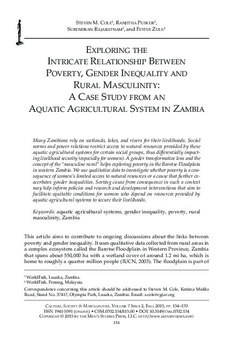Exploring the intricate relationship between poverty, gender inequality and rural masculinity: A Case study from an Aquatic Agricultural System in Zambia

Citation
Cole, S.M. et al. (2015). Exploring the intricate relationship between poverty, gender inequality and rural masculinity: A Case study from an Aquatic Agricultural System in Zambia. Culture, Society & Masculinities, 7(2)
Many Zambians rely on wetlands, lakes, and rivers for their livelihoods. Social norms and power relations restrict access to natural resources provided by these aquatic agricultural systems for certain social groups, thus differentially impacting livelihood security (especially for women). A gender transformative lens and the concept of the "masculine rural" helps exploring poverty in the Barotse Floodplain in western Zambia. The authors use qualitative data to investigate whether poverty is a consequence of women's limited access to natural resources or a cause that further exacerbates gender inequalities. Sorting cause from consequence in such a context may help inform policies and research and development interventions that aim to facilitate equitable conditions for women who depend on resources provided by aquatic agricultural systems to secure their livelihoods.
Permalink
Date Available
Type
Publisher
Countries
Research Themes